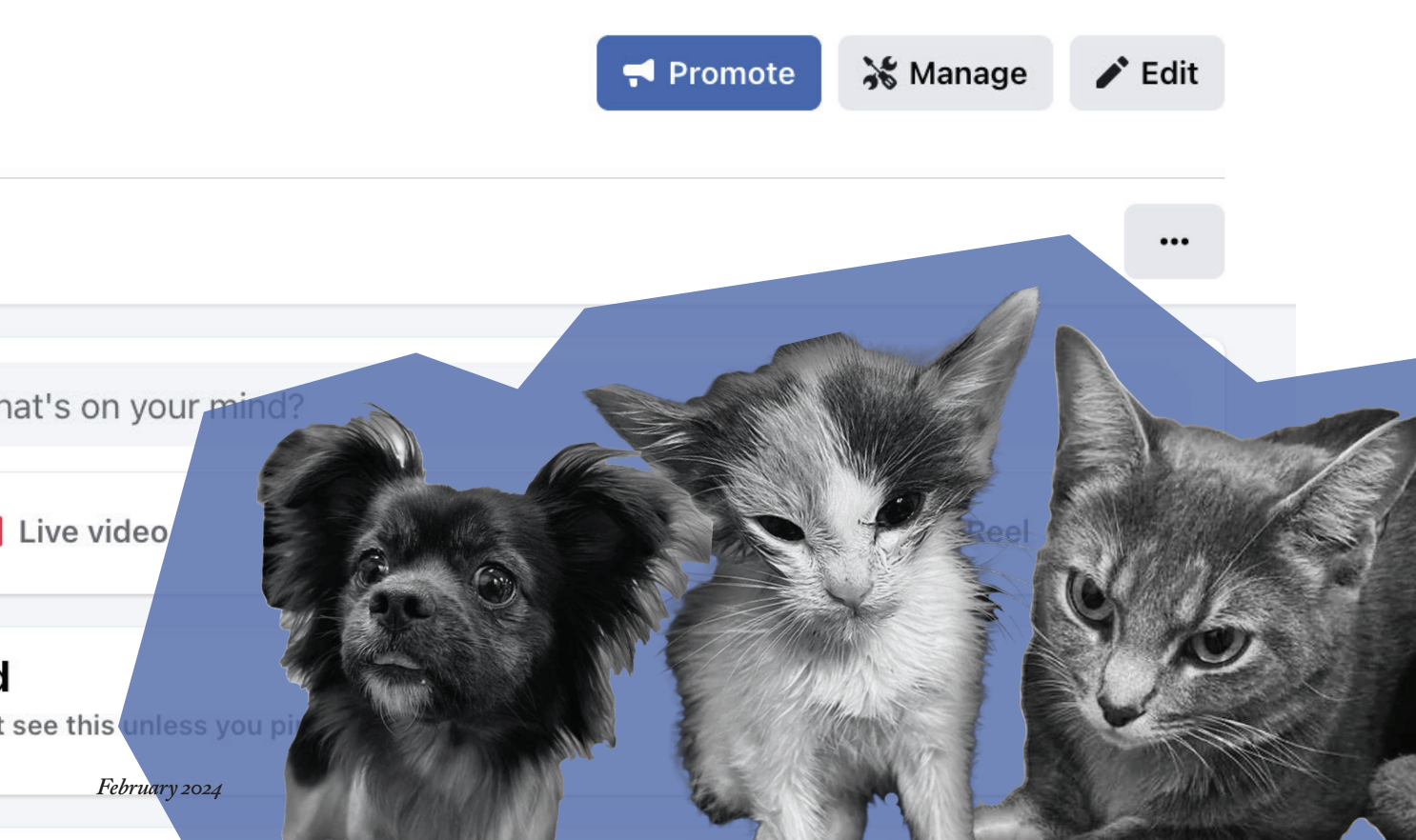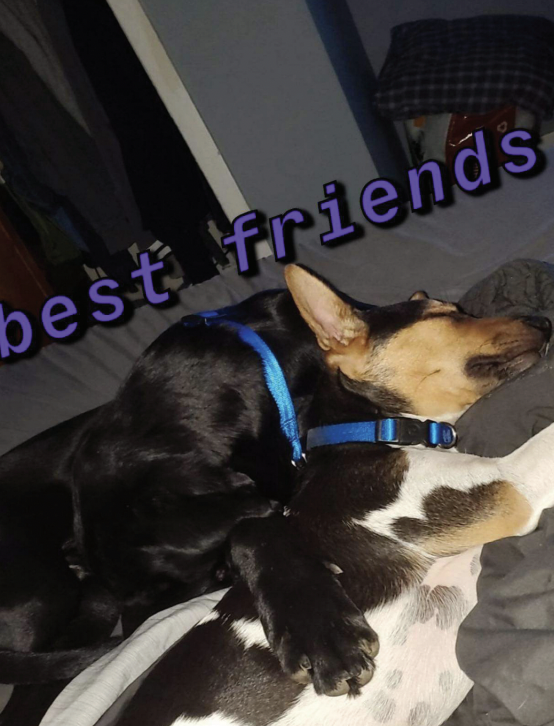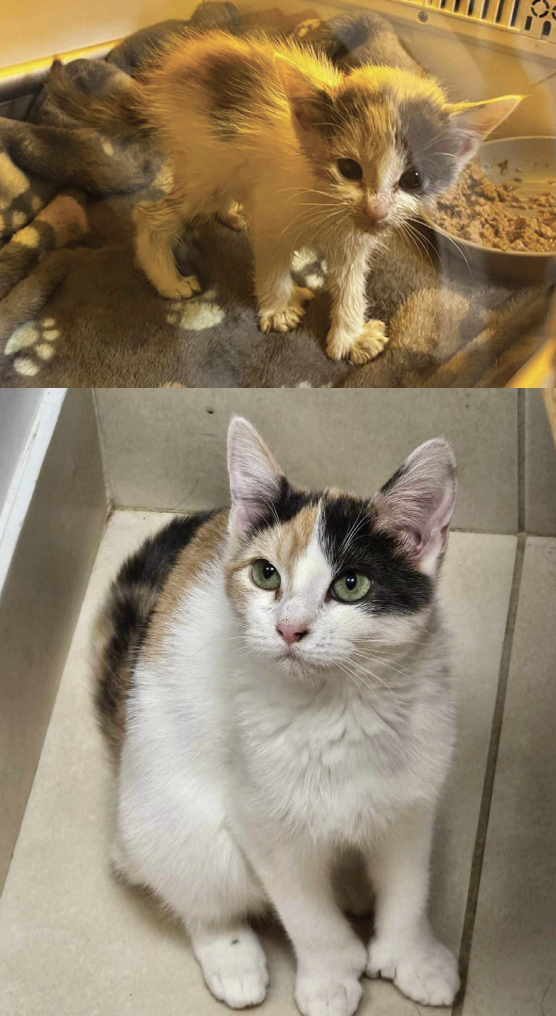
Facebook animal exchange groups make giving away pets as simple as uploading a post— but the ease of adoption lets safety fall to the wayside.
*Names of individuals who interacted with fake Facebook posts in good faith have been given pseudonyms.

“If you’re an animal lover, it’s like a member of your family, right? So they’re gone, it’s like somebody died,” Bri Hauser tells me.
A few days before we speak, Hauser drove from her home in Bloomfield, Connecticut to Rhode Island and gave away two of her dogs, Milo and Tyson, to a woman she found through a Facebook pet rehoming group. She adopted the dogs, now three and four respectively, as puppies, and they immediately became a bonded pair.
Hauser talks about these dogs as if they are people—her people—and she never imagined a situation in which she’d have to give her dogs away. When she was offered a better housing situation by someone she trusted who was aware of all of her pets, she jumped at the chance. She paid the required $1,600 to break her lease and was ready to move in. “Right before I was moving, or about to move…she told me I had to get rid of the dogs,” Hauser tells me, frustration punctuating her words.
She owns two cats and three dogs. The cats and her third dog, a Chihuahua, were fine to stay. But Milo, a Mastiff-Newfoundland mix, and Tyson, a terrier mix, had to go due to their size. New tenants were already slated to take Hauser’s former home, and she had no idea what to do next.
“It kind of sent me into panic mode,” she tells me. “I literally tried everything.” Hauser considered registering Tyson and Milo as emotional support animals, spoke to the Connecticut Humane Society and the rescue she had originally adopted them from, and considered trying to move again, but none seemed like viable options. Hauser is a single mother, so her children factored into her decision. “At the end of the day, I have three kids. I need somewhere to live.”

Hauser tells me that she had even considered sleeping in her car with the dogs to appease her landlady, but “it just wasn’t gonna work out.”
Feeling she had no other choice, Hauser turned to Facebook to find a new home for her beloved pets.
Hauser’s plight of having to rehome her pets is not a novel one. Pet owners are surrendering their animals in droves, and shelters are overcrowded and strapped for resources. The national database Shelter Animals Count reports that pet euthanasia rates in shelters were up to 8.5 percent in 2023, hitting a three-year peak. Last February here in New Haven, some animals were transferred out of The Robin I. Kroogman New Haven Animal Shelter, a division of the city’s police department, and relocated to other local shelters, after the shelter received complaints about animal neglect and failed an inspection by the Connecticut Department of Agriculture. According to a July 2022 Internal Affairs report obtained by the New Haven Independent, complaints alleged that the shelter was not providing adequate veterinary care to animals under its purview and was falsely classifying some animals that died while under the shelter’s care as “dead on arrival.”
Hauser couldn’t imagine surrendering Tyson and Milo to a shelter, with no idea who would adopt them or where they would end up. As an animal lover, Hauser was already part of several Facebook pet rehoming groups, though she had always used them just to browse. Now, they seemed like the best option for finding her dogs a new owner, as they allowed her to personally make the decision about where her dogs were going.
But these groups, born out of frustration and necessity, carry their own potential for harm. Although cats and dogs are the most popular fare on these pages, turtles, rats, pythons, and any number of other animals are also posted. The unrestricted nature of these virtual spaces makes effective regulation a near impossible task, so pets can end up in any number of dangerous situations, from the homes of unqualified owners to the dogfighting ring.

Overwhelmed and Under-resourced
“If push came to shove, and I had to give them to a shelter, I don’t think I could have done it,” Hauser told me, after hesitating a moment to consider the possibility. “I think I probably would have just moved…You hear the horror stories.”
Many people surrendered their pets to shelters as the COVID work-from-home era came to an end. According to Shelter Animals Count, from October 2021 to October 2023, there was a 22.7 percent increase in the number of dogs relinquished to Connecticut shelters by owners and a 20.5 percent increase in stray cat and dog intakes. At the same time, the database reported that cat and dog adoptions in Connecticut fell by 9.2 percent from 2022 t0 2023, so there is an imbalance between shelter populations and adoptions. As a result, unadopted pets languish in shelters, straining rescues’ limited resources.
The shelter crisis manifests differently across Connecticut, with some begging for food donations online and others simply failing to provide the necessary level of medical care or nourishment to animals under their supervision. After the Robin I. Kroogman New Haven Animal Shelter came under fire, shelter supervisor Officer Joseph Manganiello was transferred to a different department in February 2023, and the facility was placed under new management.
In the Internal Affairs report, Assistant Animal Control Officer Tammy Hewston, who has worked at the shelter for 15 years, described a situation in which Officer Manganiello did not allow her to bring a cat with a broken leg to the veterinarian, leading the cat to “[develop] an infection and gangrene.” Kennel worker Nancy Perry also claimed that “Officer Manganiello does not take all animals to the veterinarian that need medical attention due to expenses.”
Now, the shelter has largely resumed regular operation, and the New Haven Humane Commission is slowly working to revamp the facility. A representative from the Police Department could not be reached for comment.
Hauser feared what would happen to her dogs if she left them at a shelter.
“These are my babies, and I don’t want them to be put in a cage, with the potential for them to be split up,” she tells me.
“Tyson would have been fine, but Milo literally won’t go to the bathroom unless Tyson is there.”
So she turned to Facebook. “I’m not just going to give them to anyone. I need to know that you have time and love for them,” she wrote in Facebook group Connecticut Free Pets on January 3. Along with the post, Hauser attached photos of a spunky Tyson posing in a car and Milo, a large, snuggly black dog, sleeping peacefully on top of his small terrier companion.
Hauser uploaded her post to several groups, and the responses—both desired and undesired—came quickly. An overwhelming number of people left judgemental comments on the post, many offering unsolicited advice about how Hauser might be a better owner and keep her pets. “It’s not something I wanted to do. I mean, I’ve been literally sick to my stomach since I gave them away,” she tells me.
At the same time, Hauser received messages from about eight people interested in taking in Tyson and Milo. She was left with the difficult, heartbreaking task of deciding who among them would offer her dogs a safe and loving home.
A Flawed Solution
As soon as I type the phrase “free pets Connecticut” into the search bar under Facebook’s groups tab, the site returns a list of more than a dozen groups offering just that—free pets in Connecticut. After answering a few simple questions—mostly about whether I agree to follow rules like “no fees” and “must live in CT”—I gain access to several of the groups, which are but a small selection of localized Facebook pet exchange groups that exist across the country. Scrolling through the pages, I see blue-eyed kittens piled in a bucket, a blurry photo of a dog that needs to be rehomed as soon as possible for unspecified reasons, and a paragraphs-long plea for someone to take in a beloved cat because his owner can’t bring him along in a move. The images accompanying many of these posts look like photos a doting owner would snap to send to their friends or family—a dog with perked ears and a lolling tongue, a cat nestled in a blanket on a couch. Now, these pictures are used to find these pets new families.
There’s no single reason why people turn to these groups to rehome their pets. For some like Hauser, it’s an act of desperation. For others, simply a matter of convenience. Sometimes people explain their reasons in detail: relocation, financial hardship, lack of time, behavioral problems, or medical issues related to another pet or person in the household. “Free to a good home” is the common, if naïve, sentiment shared by many posters.
Animal welfare professionals are all too familiar with the dangerous fallout of Facebook adoptions. “Sometimes they’re genuinely picked up by people that want to have an animal and love them,” Virginia Maxwell, an animal cruelty forensics specialist at the University of New Haven, tells me. “They’re also picked up by dog fighters to use as bait animals where they’ll just get ripped apart…they can end up just being abused.” Others become victims of bestiality or hoarding, she explained. Pet “flippers” will also get free animals from these pages and then resell them for a profit.
“Dog fighting is still very prevalent…underground, but very prevalent,” says Kristine Cormier, a volunteer at The Animal Haven, a private nonprofit animal shelter based in North Haven, “and they would mark bait animals by dyeing them.” Volunteers and staff at the shelter join the groups to keep tabs on things, or people from the animal welfare community will send them posts they find shady.
Often, it is difficult to distinguish between malicious and well-meaning but ill-informed posts on these Facebook groups.
A young woman Cormier met through her animal welfare community on Facebook unexpectedly reached out in September begging for help. She told Cormier her sister was getting cats through Facebook and selling them for a profit. In one instance, a kitten her sister was flipping became really sick, but her sister didn’t have the money to take it to the vet.
Cormier told me another story about a dog adopted from Facebook by a couple from New York and brought to Connecticut when they moved. After splitting up, the boyfriend placed the dog, locked inside his carrier, into a bathtub and attempted to drown him. Though it is possible that the couple adopted the dog from a one-off post, pet exchange groups can be a hotspot for these sorts of interactions.
Company Policy
Under Facebook’s current Community Standards, exchanging pets on Facebook is mostly unrestricted. While the company prohibits any “content that attempts to buy, sell or trade live non-endangered animals,” it has created a loophole by providing an exception for content “posted in the context of donating or rehoming live non-endangered animals, including rehoming fees for peer-to-peer adoptions.” Thanks to this addendum, ‘free to a good home’ groups thrive, and “peer-to-peer adoption” becomes a more savory euphemism for unregulated pet exchanges between strangers.
Joyce Glass, an attorney who has focused her career for the last decade on legal issues concerning companion animal cruelty, says regulation on a federal level is unlikely.
“We’re never going to get that,” Glass tells me, laughing ruefully. “We can’t even get the USDA to do its job with commercial breeders.”
Imposing legal restrictions on the exchange of animals through Facebook seems improbable, though Glass remains hopeful that change can happen on the company level. But for now, pet exchange groups continue to operate unregulated, shuttling pets to destinations unknown.
Difficult Choices
Hauser knew about the potential dangers lurking in these groups, and she did her best to sift through the people interested in her dogs.
Hauser explained she paid particular attention to the types of questions people were asking about Milo and Tyson, and if they were asking questions at all: “Do you want to know how big Milo is? Do you want to know what kind of food they eat? Do you want to know the last time they’ve been to the vet?”
Vetting potential adopters is standard fare at any animal rescue. The process is one of the only safeguards to ensure that animals don’t end up in dangerous situations. It also alerts people to the obligations, challenges, and costs of owning a pet before it is already in their possession.
The Greater New Haven Cat Project (GNHCP) is a nonprofit feline welfare organization and rescue that adheres to a strict vetting process. According to GNHCP President Cheryl DeFilippo, potential adopters are asked to show a lease which confirms they can have pets in their home, provide names of personal references or a veterinarian, and answer questions about their pet ownership style, such as if the cat will live indoors or outdoors and if the owners are planning to declaw. They also ask about an owner’s plans should they experience a medical emergency: “What happens to your pets, should something happen to you?” The correct response is not calling a rescue organization or surrendering a pet to a shelter, she added. “We really try to look at that commitment.”
Without a formalized application process on Facebook, the responsibility to assess a potential adopter’s fitness falls on the rehomer. For Hauser, vetting potential owners was especially important because of her desire to keep her dogs together, along with Milo’s anxiety issues—“Milo was literally my shadow,” she tells me. She asked about people’s living arrangements, other pets and kids in the household, and their prior experience with dog ownership, along with vet references.
It was through this process that she picked Tyson and Milo’s new owner, a young woman from Rhode Island. The woman seemed excited to take on the dogs and met all of Hauser’s criteria.
“I feel like I’m a people reader. I can get a vibe from people just off of, you know, messages,” she tells me. “She didn’t seem like an evil-spirited person.”
In Moderation
I first see Joshua Zee’s name in the comments section of a rehoming post in Free Pets CT and Approved Rescues! And wherever I go, Zee’s comments pop up time and again.
Zee works as a cat fosterer through the Branford Compassion Club, a nonprofit feline rescue organization. He temporarily houses cats—who he almost exclusively refers to as “kitties”—while he finds them forever homes.

Since he started working as a fosterer in 2021, Zee has become a sort of guardian angel over the group. He constantly combs through posts to advise people to heavily screen potential adopters. “You have to navigate those groups so cautiously,” he tells me. “You have to pretend like everyone’s a bad guy because you can’t trust that people aren’t doing bad things to them.”
People are quick to pass judgment in the comments sections of posts—hurling accusations of abuse and neglect at one another. Zee understands that people come to these sites to rehome their pets for any number of reasons. Furthermore, animal safety outweighs any potential Facebook berating. He tries to be as gentle as possible with rehomers, and he finds that they are generally receptive to his suggestions to ask for vet references or do a home check over FaceTime.
Though Zee believes people start these sites with good intentions, adequate supervision is impossible. “You have people that say, ‘Oh, let me put these parameters up to say, do this, do that, do the other thing,’ but there’s no checks and balances to that unless someone reports you or you as an admin see it,” he tells me.
In some of the groups, administrators are extremely diligent about the pet information that users’ posts must include to be approved, and they aren’t afraid to remove any users they feel aren’t meeting their guidelines. But in a large group like Connecticut Free Pets with a growing population of over thirty-one thousand members and more than fifty posts a month, staying on top of every post, exchange, and interaction can be a lot, especially for administrators who likely have other day jobs.
“There is a group I joined recently, and those moderators or admins are super agro. They don’t mess around,” Zee tells me. “She’s always posting [things] like, ‘This person’s been deleted,’ ‘This person’s a scammer,’ ‘This person’s shady’ … She must not have a job. She’s at home and monitors the Facebook group, because she doesn’t do any BS,” he adds, laughing.
These groups seem to teeter on the edge of outright chaos, held at bay only by a group of self-appointed administrators when they have the time. After all, Zee tells me, Facebook adoption sites are “full of the kindest people in the world and the slimiest people in the world.”
Dodge’s New Home
Curious to witness these dealings for myself, I created two fake accounts and joined several of the Connecticut pet exchange groups. With nothing but a blank page and a profile photo to my name, I could already seek out pets for adoption and put up my own for rehoming — and that is exactly what I did.

As I crafted the posts, I tried to stay detached from the fake dogs I was creating: “2-yr-old male pit bull named Dodge needs to be rehomed ASAP. My building is under new management, and the landlord will not allow pets. Unfortunately I cannot afford to move right now. Located in New Haven, CT.” I attached a photo pulled from Pet Finder of a young pit bull grinning goofily at the camera. Already feeling guilty for subjecting this semi-imaginary dog to the unknown dangers of Facebook, I uploaded the post to Free Rehoming of Pets Only Connecticut Group!
Within twenty-four hours, I received messages from four users interested in adopting Dodge. They wanted to know just one thing: not if he was neutered or up to date on shots, but whether or not he got along well with other pets. After I said yes, one prospective adopter, Charlotte*, started asking when she could have him. “I want him. Can you bring him to me[?]” A few hours later, she followed up with, “When can you bring the dog.” And the next day, “Can I have him.” Despite knowing next to nothing about Dodge’s temperament or needs as a pet, Charlotte was insistent that she have him as soon as possible. If I had shown up with a dog like Milo, a massive dog with anxiety and past trauma, would she have taken him?
Beth* was also eager to adopt Dodge, but I immediately noticed red flags on her profile. She did not have a profile photo, posts, or any personal information aside from her birthday, which indicated she was 18 years old. When I pressed her further about whether she was still a high school student and if she was planning to adopt Dodge with her family, Beth ignored the question about her family and replied, “Yes I am a student.” I asked again, and she clarified that she was planning to adopt Dodge by herself. Whether or not this evasion was intentional, it made me uneasy.
Beth had mentioned that she owned a cat and another dog, so I asked if those pets were hers or her parents. “My cat lives in the cupboard and Dodge will be with me and mom,” she responded, again offering a confusing and inconsistent portrait of Dodge’s potential future home.
The morning after, Beth messaged me: “I changed my mind I’m going for a different dog.” Though she later returned and re-expressed her interest in Dodge, her initial response speaks to how these groups cater to ill-intentioned or, at the very least, unqualified adopters. If one person asks too many questions, you can simply move on to the next. And before long, you are bound to find a person more concerned with getting rid of their pet than where their pet ends up.
I ask Beth one final time about her plans for Dodge, and I finally get a clearer understanding of the situation. Beth explained to me, in a message riddled with misspellings, that she would be responsible for Dodge’s day to day care, but her mom would be present and would split the cost of food and veterinary bills.
Even if Beth is simply a teenager eager to have her own pet, it is hard to imagine that these explanations would pass muster with any official rescue organization. But if I wanted to, I could have given Dodge away to a complete stranger, deleted my post and Facebook account for good measure, and washed my hands of the whole situation in less than forty-eight hours.
Uncertain of how to break off the conversation, I let Beth’s messages sit. In a way, I wondered if delaying my response will keep her from seeking out another dog—a real one this time—and I felt like that might be a good thing. Then I wondered if it was fair of me to judge her fitness as an adopter. Ultimately, I told Beth that I gave Dodge to a family friend and no longer needed to rehome him. I could see that she read the message, but she didn’t respond.
A Goodbye
Hauser and her eldest daughter drove the dogs to Rhode Island together. Up until this point in our conversation, she has maintained her composure. Now, she breaks.

“Milo, when he saw me start crying, he sat in front of me…I’m gonna cry.” The line goes quiet for a moment, and I hear Hauser take a breath to calm herself. She starts the story again.
“He just sat in front of me and started licking my face,” she says. Her voice wavers. “[He] was hesitant about going, so I pretended to walk up the stairs and then went, and that was it.” A silence hangs between us, and I’m unsure how to respond.
“I was just so distraught. Almost part of me was hoping that [the dogs] were freaking out and that she wanted me to turn around, but she said they were fine.”
One of Hauser’s stipulations for the adoption was that she wanted to keep in touch with the new owner to make sure Tyson and Milo transitioned well into their new home. She dropped them off on Thursday, January 18, and got updates from the owner on Friday. But when she reached out on Sunday to check in, Hauser discovered that she had been blocked from the woman’s Facebook page, unable to contact her.
“So I start freaking out because I didn’t know if I had made a wrong decision, if my dogs were running around in Rhode Island, if she had sold them.”
Hauser was able to get in contact with one of Free Pets in CT’s administrators and was able to reach the woman, who sent photos and videos to show that the dogs were okay. Hauser’s sister also got in contact with her. The woman claimed that her Facebook page had been hacked, but Hauser is hesitant to believe her.
Now that she’s been assured of the dogs’ safety, she’s grieving their loss. “Obviously, I never want to forget them,” she says. “I’m covered in tattoos, so I’m already planning a tattoo for them,” she tells me excitedly, even laughing a little.
“But I just want to be more at peace with my decision, and—oh my god, why am I gonna cry?” The joy of loving Tyson and Milo and the burden of having to give them away seem to take Hauser in turns. “I want to be able to forgive myself.”
Hauser confesses to me that she wonders if the dogs would have been better off if she had never adopted them in the first place. “But then again, like my mom said, ‘Who’s to say that she’s not giving them a great life too?” As the words come out of Hauser’s mouth, I can tell that she’s trying to will herself to believe them.
– Idone Rhodes is a junior in Pierson College.

